Can a school help China qualify for the World Cup?
- Published
Young players attend the world's biggest football academy in China
That China is dreadful at football is no secret.
It currently languishes in 103rd place in the Fifa World Rankings, external, just below Equatorial Guinea.
Its national league has been mired in corruption and match-fixing scandals of such scurrilous depths that, in one infamous incident, a team coach was seen urging his players in the dying minutes of a game to take shots on their own goal.
The Evergrande Football School is meant to change all that.
An hour or so outside the southern city of Guangzhou, palm trees line the road to the front gate.
Beyond it lies what must be one of the most extraordinary symbols of sporting ambition and expectation ever built.
The school's turrets and towers rise above the surrounding countryside like a Transylvanian Castle. The courtyards and galleries give the feel of an English public school and the facilities - an Olympic-size swimming pool, tennis courts and 42 full-sized football pitches - would be the envy of many of them.
In the 2,300-place boarding school, pupils attend normal academic lessons but get their football - at least an hour a day - from a team of Real Madrid-trained coaches.
The whole thing was built in less than a year at a cost of almost $200m (£117m), the brainchild of the billionaire owner of one of China's biggest football clubs, Guangzhou Evergrande.
But the school claims high-level political support too.
"Chinese President Xi Jinping has three wishes," the school's headmaster, Liu Jiangnan told me. "To qualify for, to host and to win the World Cup."
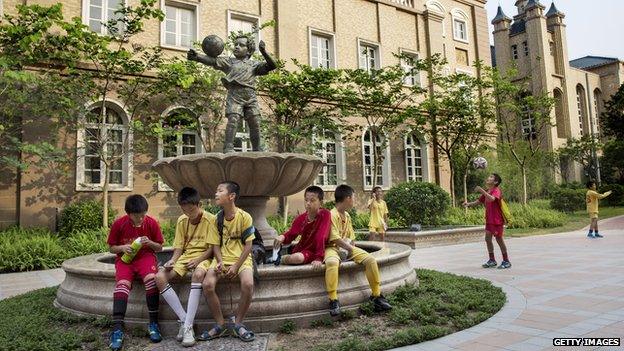
The school is considered the largest football academy in the world
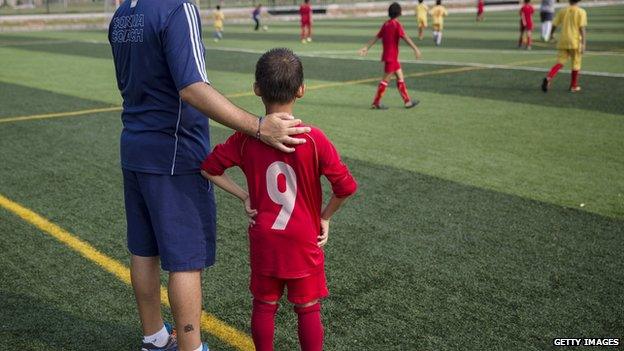
Students are trained by professional football coaches
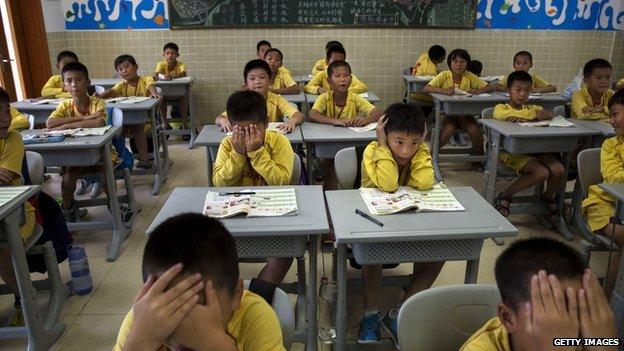
In addition to football training, students must also attend daily academic lessons
Out on the field, instructions are shouted out in Spanish and are then translated into Chinese.
One of the coaches, Bruno Mesquita, a man who served time at Real Madrid and FC Porto, is a believer. He believes the school can help lift the quality of football in China, if nothing else, because of the sheer scale of the project.
"Maybe we are not crazy enough to build something like this but the Chinese recognise that they have some space to grow professional football and they decided to invest," he said.
"We have the material and the human resources here. We are good coaches, we believe in the point, the target… to grow national football players and to grow Chinese football."
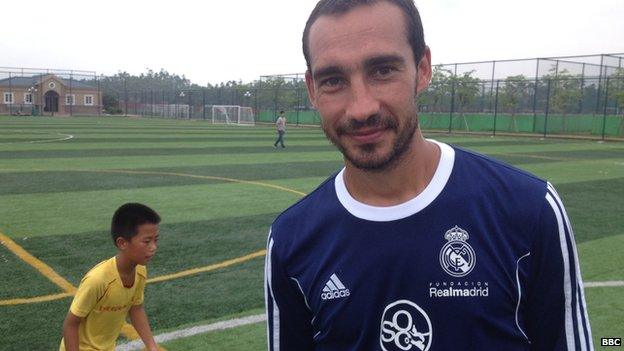
Football coach Pablo Amo has some reservations about the school's ambitions
His colleague, former Spanish professional footballer Pablo Amo, is equally impressed with the facilities they have been given but seems a little less certain about the mission.
"In my career, I played with some amazing players who never got to be professional," he said.
"So from all these kids, maybe just a few are going to be professional but for all of them, we have to try to see that they love the sport, to give them happiness using football."
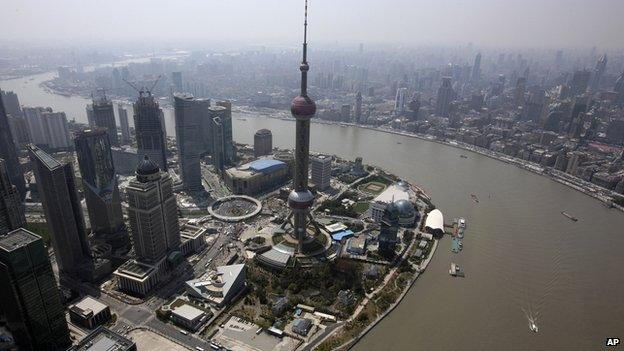
Fields and open spaces to play football in, are rare in China's rapidly developing landscape
In fact, therein lies the real problem for China.
Despite the popularity of football as a spectator sport and the massive television audiences it generates, very few young Chinese people are actually enjoying the real thing.
In between the high-rises of the big cities, you might catch sight of kids bouncing a ball around a basketball hoop.
But an honest-to-goodness jumpers-for-goalposts kick-about? Very rare indeed.
The reasons are many.
Firstly, the rampant building boom of the past few decades has left very few surviving fields and open spaces.
The education system is another challenge - the intense pressure on children to study long hours for exams leaves little room for extra-curricular activity.
For that reason, the few that do play youth team football have often given up by the age of 14.
Then there's the Communist Party's suffocating prohibition on any social organisation outside of its control which makes the setting up of local sports clubs a difficult task.
I was once told by the organiser of a football youth league in Beijing, which was established after long and tortuous negotiations with the authorities, that he was ordered to close the whole thing down for a few weeks over the summer of 2008.
The reason? The government deemed any large gathering of people a potential security threat to the Olympic Games that the city was proudly hosting that year amid much talk of a sporting legacy for China's youth.
And lastly, if all the above are not enough to kill off an outdoor sporting culture, then the choking country-wide pollution should do the trick.
Above anything else, it is the resulting lack of grass-roots involvement in football that might best explain why a country of 1.3 billion people cannot find 11 players good enough to qualify for the World Cup, let alone win it.
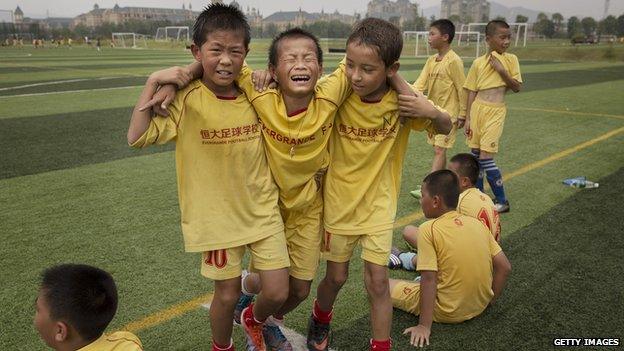
Some critics wonder if the school will be able to field professional football players
Messi, Ronaldo, Rooney and Beckham, to take just four football stars, all had the benefit of prestigious youth football academies run by big top-flight clubs. But they were given places at those academies because their young precocious talents had already shone amongst thousands of their contemporaries enjoying sports for sports' sake in school sides and local youth leagues.
The Evergrande Football School, aiming to emulate the talent producing machines of Real and Manchester, provides some of its pupils with scholarships but the vast majority pay a fee of $6,000 a year to attend, an astronomical sum for your average Chinese family.
When their sons were born, the fathers of the four international greats mentioned above worked, in the order listed, as a factory steel worker, a municipal gardener, a labourer and a kitchen fitter.
Even if China had a club scene in which young working-class talent could shine, the steel-working, labouring fathers of that talent are very unlikely to be paying for it to be polished at Evergrande.
But the school is bullish about the future and the optimism rubs off on the children.
Out on the pitch, after a training session in the tropical southern heat, a ten-year-old with sweat running off his brow, tells me that he has faith in his school's mission.
"China is kind of weak in football right now but when I grow up, I want to win honour for Chinese football and to win the World Cup," he says.
The headmaster is confident too: "Our school's mission is to strengthen Chinese football and to produce football stars. The giant statue of the World Cup that you see at the school's entrance is very representative of our goal."
- Published13 June 2014

- Published13 June 2014
